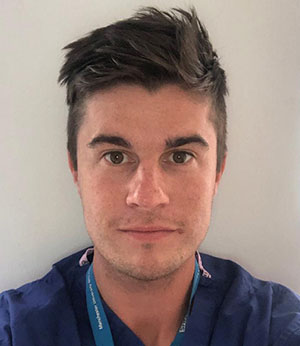Not all disabilities are visual

Had I been told that at 27 years of age I’d have life experiences that few others could imagine I would have answered with a mixture of curiosity and intrigue. My path had always seemed such a well-trodden one. Ten years spent following a long line of Barlings into a career in medicine would culminate in the cruellest of ironies. The speed with which a person’s world can be turned upside down is frightening.
Sunday 6 October 2018 was when my world tipped. I suffered an ischaemic stroke to a small region proximal to the caudate nucleus shortly after waking up prior to my final night shift as an Anaesthetic CT1.
Dealing with the rollercoaster ride of emotions that inevitably followed the stroke is an impossible task to describe.
Had it not been for thrombolysis I may never have made a full physical recovery from the right arm and leg deficit that had preceded this therapy. This physical recovery was testament to the medical staff at Salford Royal Hospital, led by Stroke Consultant Dr Burger, who made strong, decisive decisions when they needed to. Thenceforth, I have come to appreciate how ‘not all disabilities are visual’.
Dealing with the rollercoaster ride of emotions that inevitably followed the stroke is an impossible task to describe. The fear that initially surrounds the cause (later diagnosed as a PFO for which I had surgical repair one month later under Consultant Cardiologist Mr Malik at Hammersmith hospital). The fallibility that now replaces the invincibility you realise you once felt. The anxiety that overcomes every minute of every day that feels like it will never reside. The panic attacks, never before experienced, which convince you this is happening all over again. Then there is the impact that all this has on your relationships with those closest to you, not to mention in returning to training as a Junior Doctor.
This is a hidden illness. No one sees it. No one goes through it with you unless you let them. Then there’s the guilt. Am I over-burdening people with this? Should I be dealing with this better? What if this takes over my identity?
I can relate to patients on a level I would never before have anticipated as I progress through Anaesthetic training.
I was always extremely conscious of the emotional impact that my story would have on those individuals I shared it with. Deep in the back of my conscious was the concern it bordered on emotional manipulation, or at least that was how it may be construed by the individual I was telling. The whole process was… draining, utterly draining.
However, time has proved a great healer. It has allowed me to appreciate the unique and privileged position I find myself in.
I can relate to patients on a level I would never before have anticipated as I progress through Anaesthetic training. I am leading positive change in educating ambulance crews nationally on neurological presentations such as my own. I am involved as part of the North West deanery’s plans to modify pre-hospital stroke guidelines. Sharing my experiences has also proved therapeutic in dealing with the mental trauma, the hidden component of my stroke.
Through years of studying through school, university and as a practising Doctor, the knowledge I have built has never felt as powerful as the tools I have gained through lived experience. Every Doctor has access to countless journals, articles, online or paper resources; all with their own merits. However, our lived experiences make us unique. How we perceive, process and learn from these experiences shapes us as individuals and ultimately determines the direction in which we head.
Daniel Barling,
ST3 Anaesthetics,
NW Deanery
Twitter: @dannybarling